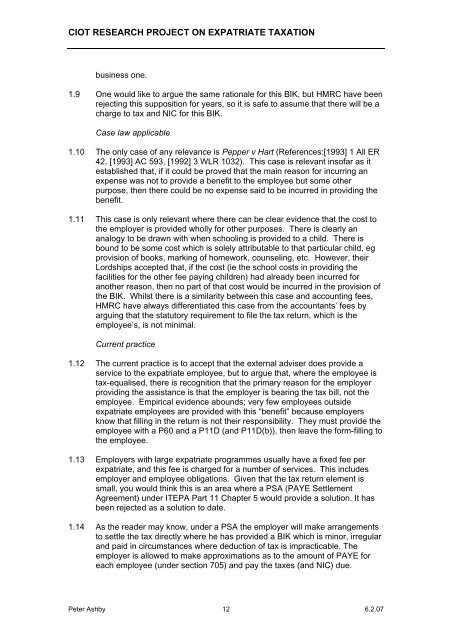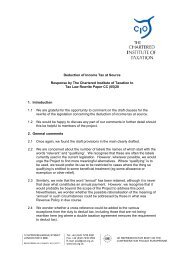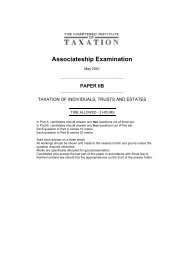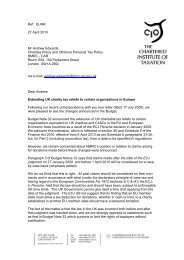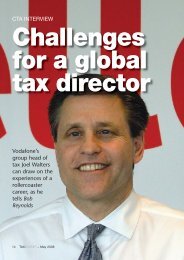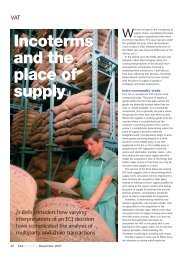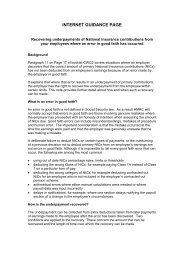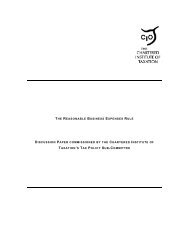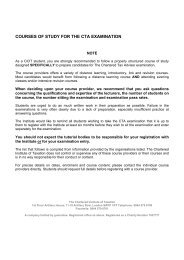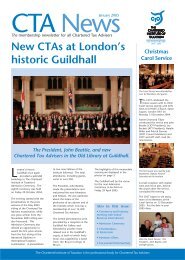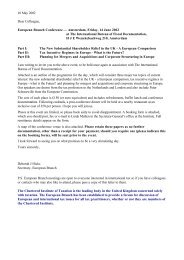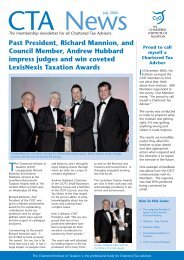Expatriate taxation - CIOT - The Chartered Institute of Taxation
Expatriate taxation - CIOT - The Chartered Institute of Taxation
Expatriate taxation - CIOT - The Chartered Institute of Taxation
Create successful ePaper yourself
Turn your PDF publications into a flip-book with our unique Google optimized e-Paper software.
<strong>CIOT</strong> RESEARCH PROJECT ON EXPATRIATE TAXATION<br />
business one.<br />
1.9 One would like to argue the same rationale for this BIK, but HMRC have been<br />
rejecting this supposition for years, so it is safe to assume that there will be a<br />
charge to tax and NIC for this BIK.<br />
Case law applicable<br />
1.10 <strong>The</strong> only case <strong>of</strong> any relevance is Pepper v Hart (References:[1993] 1 All ER<br />
42, [1993] AC 593, [1992] 3 WLR 1032). This case is relevant ins<strong>of</strong>ar as it<br />
established that, if it could be proved that the main reason for incurring an<br />
expense was not to provide a benefit to the employee but some other<br />
purpose, then there could be no expense said to be incurred in providing the<br />
benefit.<br />
1.11 This case is only relevant where there can be clear evidence that the cost to<br />
the employer is provided wholly for other purposes. <strong>The</strong>re is clearly an<br />
analogy to be drawn with when schooling is provided to a child. <strong>The</strong>re is<br />
bound to be some cost which is solely attributable to that particular child, eg<br />
provision <strong>of</strong> books, marking <strong>of</strong> homework, counseling, etc. However, their<br />
Lordships accepted that, if the cost (ie the school costs in providing the<br />
facilities for the other fee paying children) had already been incurred for<br />
another reason, then no part <strong>of</strong> that cost would be incurred in the provision <strong>of</strong><br />
the BIK. Whilst there is a similarity between this case and accounting fees,<br />
HMRC have always differentiated this case from the accountants’ fees by<br />
arguing that the statutory requirement to file the tax return, which is the<br />
employee’s, is not minimal.<br />
Current practice<br />
1.12 <strong>The</strong> current practice is to accept that the external adviser does provide a<br />
service to the expatriate employee, but to argue that, where the employee is<br />
tax-equalised, there is recognition that the primary reason for the employer<br />
providing the assistance is that the employer is bearing the tax bill, not the<br />
employee. Empirical evidence abounds; very few employees outside<br />
expatriate employees are provided with this “benefit” because employers<br />
know that filling in the return is not their responsibility. <strong>The</strong>y must provide the<br />
employee with a P60 and a P11D (and P11D(b)), then leave the form-filling to<br />
the employee.<br />
1.13 Employers with large expatriate programmes usually have a fixed fee per<br />
expatriate, and this fee is charged for a number <strong>of</strong> services. This includes<br />
employer and employee obligations. Given that the tax return element is<br />
small, you would think this is an area where a PSA (PAYE Settlement<br />
Agreement) under ITEPA Part 11 Chapter 5 would provide a solution. It has<br />
been rejected as a solution to date.<br />
1.14 As the reader may know, under a PSA the employer will make arrangements<br />
to settle the tax directly where he has provided a BIK which is minor, irregular<br />
and paid in circumstances where deduction <strong>of</strong> tax is impracticable. <strong>The</strong><br />
employer is allowed to make approximations as to the amount <strong>of</strong> PAYE for<br />
each employee (under section 705) and pay the taxes (and NIC) due.<br />
Peter Ashby 12 6.2.07


